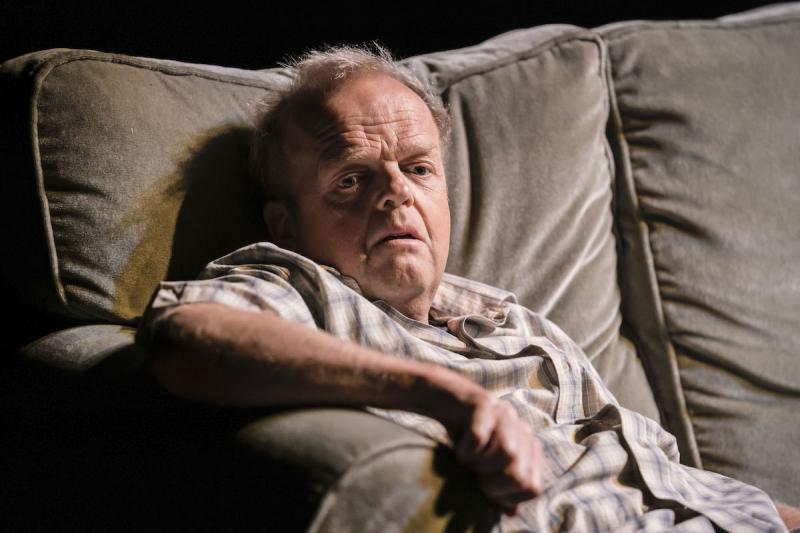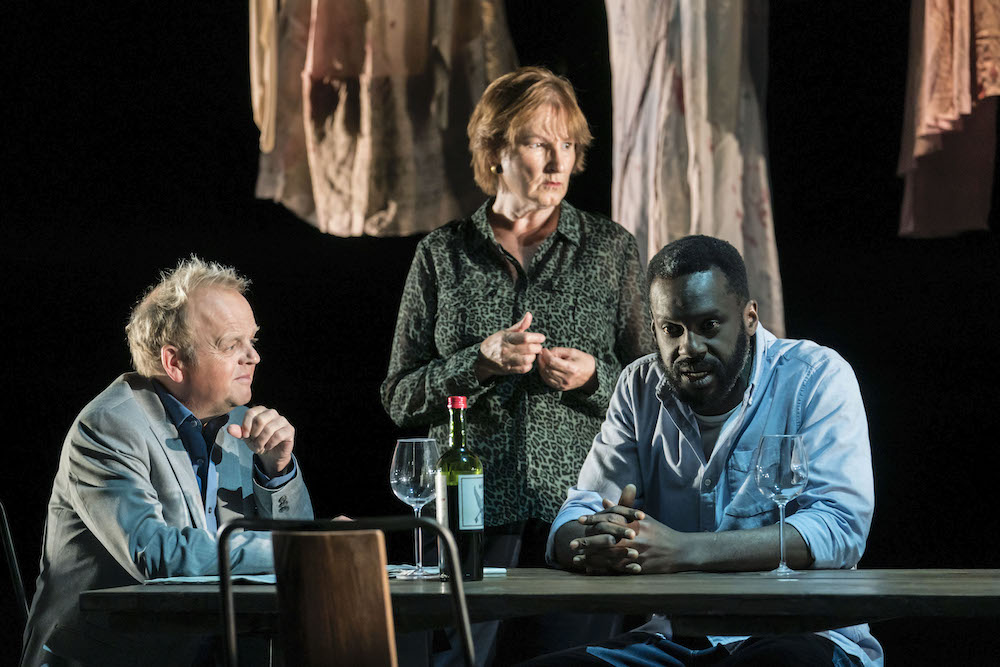Glass Kill Bluebeard Imp , Royal Court review - still experimental after all these years | reviews, news & interviews
Glass. Kill. Bluebeard. Imp., Royal Court review - still experimental after all these years
Glass. Kill. Bluebeard. Imp., Royal Court review - still experimental after all these years
Caryl Churchill's latest offering is wonderfully bright and incisively perceptive

At the age of 81, Caryl Churchill, Britain's greatest living playwright, is still going strong. Her latest is a typically imaginative quartet of short plays. Each of them is vividly distinct, being linguistically agile, theatrically pleasurable and emotionally dark, yet all are also united by the common theme of folk tales and strongly archetypal stories.
The first playlet, Glass, is about a little girl, who is "made of glass", so she's metaphorically transparent and fragile, especially when she is bullied in a story that also features painful issues of abuse. As she exists among household items such as a talking clock, a happy red plastic dog and a vase, the atmosphere of a toy story contrasts with the disturbing sense that everyday violence often goes unseen. This short piece has a bright comic flavour, although the colourful nature of the toys and the stereotypical humans is left to our imagination. As the playtext says, "There should be no attempt to make the glass girl look as if she is made of glass". Whatever is taking place is happening inside our heads.
In Kill, Churchill reminds us that the roots of domestic violence go back to ancient myths, as her Gods retell the stories of the Trojan War and the House of Atreus in a breathless monologue which is punctuated by the interjections of the People, played by a single small boy (Caelan Edie on press night). In fact, the plural "Gods" is deliberately playful since they are also all played by one actor (Mothersdale) as a cheerful almighty, who smokes and underlines the fictionality of all myths by opening saying that Gods don't exist and are random in their reactions. The deeper point is that if the barbarity of ancient Greek revenge killings and brutal deities are at the heart of Western civilization then it's hardly surprising that today's murderous psychos can "be so charming".
 Which is the theme of Bluebeard's Friends, in which the legendary serial killer of some nine wives is treated as a suburban Ripper who was never suspected by his neighbours and whose collection of bloodstained dresses, all that remain of his victims, can be monetized for profit. As can his tourist-ready castle. His friends meet to eat and drink together, while remembering their complicity in his killings. The result is oddly mundane and nightmarish, both gloriously gothic and slightly sickening. As these ordinary individuals - convincingly played by Jones, Findlay, Sarah Niles and Sule Rimi (pictured above with Jones and Findlay) - chat about the violence that has been meted out to Bluebeard himself, in revenge for his murders, a strain of black comedy pulses though their exchanges. They even comment on how this whole story is "quite noir".
Which is the theme of Bluebeard's Friends, in which the legendary serial killer of some nine wives is treated as a suburban Ripper who was never suspected by his neighbours and whose collection of bloodstained dresses, all that remain of his victims, can be monetized for profit. As can his tourist-ready castle. His friends meet to eat and drink together, while remembering their complicity in his killings. The result is oddly mundane and nightmarish, both gloriously gothic and slightly sickening. As these ordinary individuals - convincingly played by Jones, Findlay, Sarah Niles and Sule Rimi (pictured above with Jones and Findlay) - chat about the violence that has been meted out to Bluebeard himself, in revenge for his murders, a strain of black comedy pulses though their exchanges. They even comment on how this whole story is "quite noir".
The longest piece is the hour-long Imp, in which Jimmy and Dot, a pair of aging cousins, make friends with the younger Niamh and Rob, whose growing affection for each other takes place against a series of references to Oedipus, Hamlet, King Lear and Romeo and Juliet. As the chair-bound Dot contemplates releasing her Genie-like imp from its old wine bottle, other stories of savagery circle this domestic scene. While Jimmy is a manic jogger, keeping his own personal dark stuff at bay by increasing doses of physical exercise, Dot talks to and comments on Niamh and Rob, occasionally losing control and giving vent to the boiling anger within. It comes as no surprise that she has herself been involved in homicidal rage.
These four pieces are beautifully directed by James Macdonald, whose cast - especially Jones, Findlay, Mothersdale and Louisa Harland - all give precise performances, making this is an evening in which imaginative experiments with theatre form co-exist with an atmosphere of suggestion, fear and dread. Behind each family, Churchill suggests, lurk dark shadows. The other cast members, Kwabena Ansah, Patrick McNamee and Rebekah Murrell, are likewise impressive and the design, by Miriam Buether, stresses the theatrical nature of the show. During the brief pauses between the short plays, there are some fun juggling and acrobatic acts. And although the tone is emotionally cool at all times, the spectres of anger and violence brood in the background of even the most banal tales. Yes, this is how it is.
rating
Explore topics
Share this article
The future of Arts Journalism
You can stop theartsdesk.com closing!
We urgently need financing to survive. Our fundraising drive has thus far raised £49,000 but we need to reach £100,000 or we will be forced to close. Please contribute here: https://gofund.me/c3f6033d
And if you can forward this information to anyone who might assist, we’d be grateful.

Subscribe to theartsdesk.com
Thank you for continuing to read our work on theartsdesk.com. For unlimited access to every article in its entirety, including our archive of more than 15,000 pieces, we're asking for £5 per month or £40 per year. We feel it's a very good deal, and hope you do too.
To take a subscription now simply click here.
And if you're looking for that extra gift for a friend or family member, why not treat them to a theartsdesk.com gift subscription?
more Theatre
 Ragdoll, Jermyn Street Theatre review - compelling and emotionally truthful
Katherine Moar returns with a Patty Hearst-inspired follow up to her debut hit 'Farm Hall'
Ragdoll, Jermyn Street Theatre review - compelling and emotionally truthful
Katherine Moar returns with a Patty Hearst-inspired follow up to her debut hit 'Farm Hall'
 Troilus and Cressida, Globe Theatre review - a 'problem play' with added problems
Raucous and carnivalesque, but also ugly and incomprehensible
Troilus and Cressida, Globe Theatre review - a 'problem play' with added problems
Raucous and carnivalesque, but also ugly and incomprehensible
 Clarkston, Trafalgar Theatre review - two lads on a road to nowhere
Netflix star, Joe Locke, is the selling point of a production that needs one
Clarkston, Trafalgar Theatre review - two lads on a road to nowhere
Netflix star, Joe Locke, is the selling point of a production that needs one
 Ghost Stories, Peacock Theatre review - spirited staging but short on scares
Impressive spectacle saves an ageing show in an unsuitable venue
Ghost Stories, Peacock Theatre review - spirited staging but short on scares
Impressive spectacle saves an ageing show in an unsuitable venue
 Hamlet, National Theatre review - turning tragedy to comedy is no joke
Hiran Abeyeskera’s childlike prince falls flat in a mixed production
Hamlet, National Theatre review - turning tragedy to comedy is no joke
Hiran Abeyeskera’s childlike prince falls flat in a mixed production
 Rohtko, Barbican review - postmodern meditation on fake and authentic art is less than the sum of its parts
Łukasz Twarkowski's production dazzles without illuminating
Rohtko, Barbican review - postmodern meditation on fake and authentic art is less than the sum of its parts
Łukasz Twarkowski's production dazzles without illuminating
 Lee, Park Theatre review - Lee Krasner looks back on her life as an artist
Informative and interesting, the play's format limits its potential
Lee, Park Theatre review - Lee Krasner looks back on her life as an artist
Informative and interesting, the play's format limits its potential
 Measure for Measure, RSC, Stratford review - 'problem play' has no problem with relevance
Shakespeare, in this adaptation, is at his most perceptive
Measure for Measure, RSC, Stratford review - 'problem play' has no problem with relevance
Shakespeare, in this adaptation, is at his most perceptive
 The Importance of Being Earnest, Noël Coward Theatre review - dazzling and delightful queer fest
West End transfer of National Theatre hit stars Stephen Fry and Olly Alexander
The Importance of Being Earnest, Noël Coward Theatre review - dazzling and delightful queer fest
West End transfer of National Theatre hit stars Stephen Fry and Olly Alexander
 Get Down Tonight, Charing Cross Theatre review - glitz and hits from the 70s
If you love the songs of KC and the Sunshine Band, Please Do Go!
Get Down Tonight, Charing Cross Theatre review - glitz and hits from the 70s
If you love the songs of KC and the Sunshine Band, Please Do Go!
 Punch, Apollo Theatre review - powerful play about the strength of redemption
James Graham's play transfixes the audience at every stage
Punch, Apollo Theatre review - powerful play about the strength of redemption
James Graham's play transfixes the audience at every stage
 The Billionaire Inside Your Head, Hampstead Theatre review - a map of a man with OCD
Will Lord's promising debut burdens a fine cast with too much dialogue
The Billionaire Inside Your Head, Hampstead Theatre review - a map of a man with OCD
Will Lord's promising debut burdens a fine cast with too much dialogue

Add comment